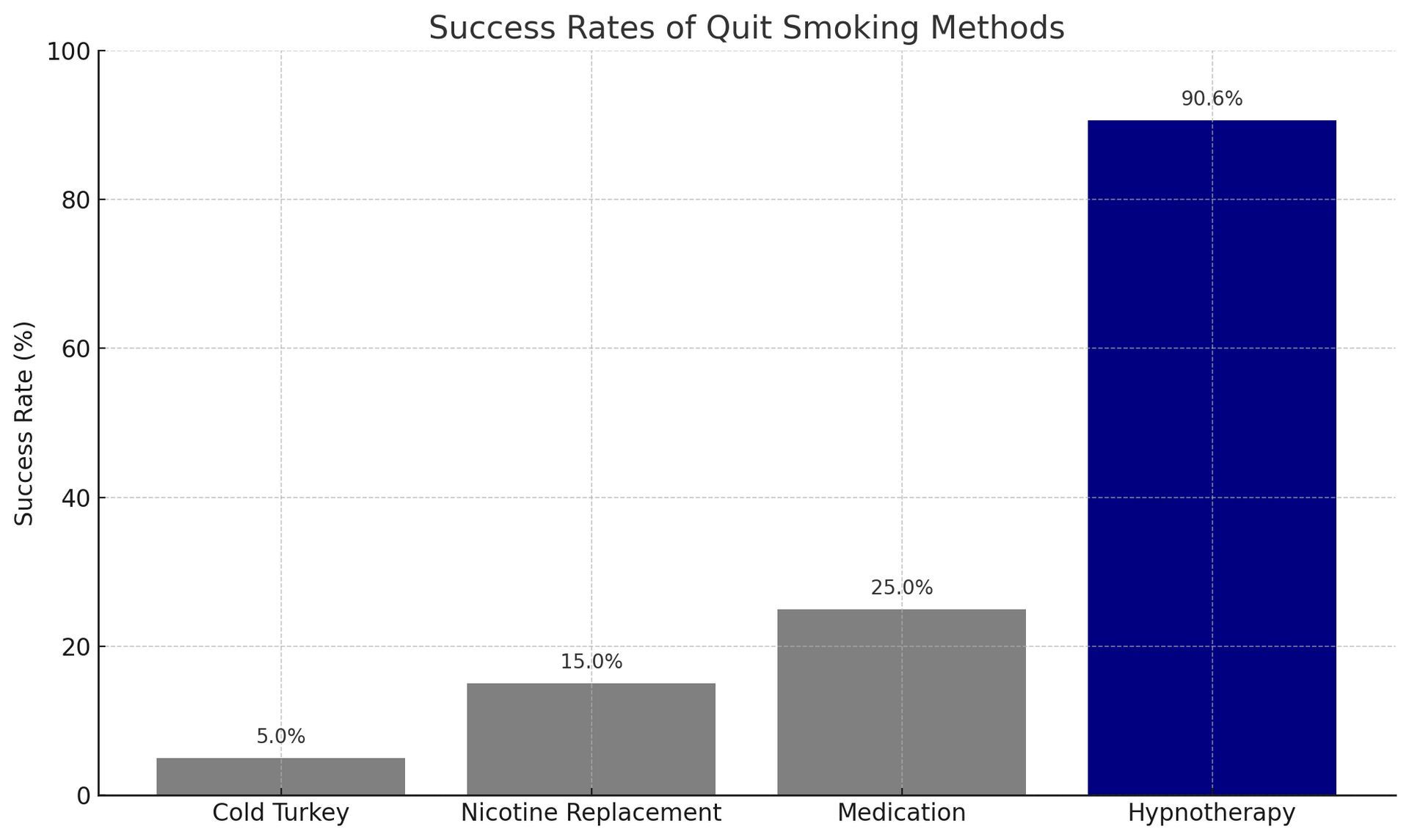
How Effective is Hypnosis for Quitting Smoking in Columbus, OH?
Imagine this: You’re a smoker in Columbus, Ohio who’s tried everything – nicotine patches, gum, maybe even going cold turkey – yet nothing has stuck. Then you hear a friend rave about quitting smoking through hypnosis. “Does that really work?” you wonder. It sounds a bit like magic or maybe even a party trick. But as it turns out, hypnotherapy might just be the secret weapon Columbus smokers have been waiting for. In fact, evidence from research and real Columbus residents’ experiences shows that hypnosis can be one of the most effective ways to quit smoking – and stay smoke-free.
Columbus has a bit of a smoking challenge on its hands. About 21.4% of adults in Columbus smoke, putting our city among the top in the nation for smoking rates (1073wsjy.com) . (For comparison, Ohio’s overall smoking rate is around 17%, already higher than the national average (truthinitiative.org). With such stats, it’s no surprise that finding a reliable way to quit is a hot topic here. So, how effective is hypnosis for quitting smoking in Columbus, OH? Let’s dive into the success rates, scientific research, and real-world stories – including some right here in Columbus – to answer that question. Along the way, we’ll see how hypnotherapy stacks up against patches, gum, or going “cold turkey,” and why Columbus Hypnotherapy has earned a reputation as the #1 smoking cessation hypnotherapy provider in Columbus. By the end, you’ll have a clear picture of whether hypnosis is the holistic, effective solution you’ve been looking for (and how you can take advantage of it). Let’s explore!
Hypnosis vs. Other Quit Methods: What Science Says
If you’re like most people, you want proof that something works before you try it. So, what does the science say about hypnosis for quitting smoking? The short answer: Hypnosis can significantly improve your chances of quitting, often outperforming more traditional methods. But let’s talk numbers and facts to really see how it measures up.
- Researchers have been studying hypnotherapy for smoking cessation for decades. One famous example is a University of Iowa analysis often cited as the largest ever comparison of smoking cessation methods. This massive study statistically combined results of over 600 studies (with more than 72,000 people across the U.S. and Europe) to compare various quit-smoking techniques. The result? Hypnosis was, on average, over 3 times as effective as nicotine replacement methods (like patches) and 15 times as effective as trying to quit with willpower alone! (meridianpeakhypnosis.com.) Yes, you read that right – 15 times more effective than going cold turkey according to this analysis! That’s a big deal, especially if you’ve ever tried quitting by sheer willpower and know how tough that road can be. To put this in perspective, consider the typical success rates of other methods:
- Going “Cold Turkey” (Willpower Alone): Only about 3–5% of smokers who quit on their own stay smoke-free long-term(switchuphypnotherapy.com) It’s the hardest way to quit – like climbing a mountain without gear.
- Gradual Cutting Down: Trying to slowly reduce smoking has limited success, around 10–15% quit success rate(switchuphypnotherapy.com) It often just drags out the withdrawal without fully breaking the habit.
- Nicotine Replacement Therapy (Patches, Gum) without support: These can double the chances of quitting compared to cold turkey, but on their own, long-term success rates are still generally in the ballpark of 10% (give or take) for many people(switchuphypnotherapy.com) They help with nicotine withdrawal, but don’t address the psychological habit.
- Medication (e.g. Chantix/Varenicline or Zyban): Prescription meds can help some smokers by reducing cravings. However, they come with possible side effects (like insomnia or mood changes, and in rare cases more serious risks (switchuphypnotherapy.com), and not everyone can tolerate or want to use them. Their effectiveness varies, and they typically work best coupled with counseling or support.
Now, enter hypnosis. Hypnotherapy tackles the challenge on a different level – the subconscious mind – aiming to break the mental and emotional ties to smoking. Let’s see some success numbers for hypnosis:
- In one program at the University of Washington School of Medicine, 39 out of 43 smokers remained abstinent at follow-ups (6 months to 3 years after their hypnosis treatment). That’s a 90.6% success rate using hypnosis (cbhypnosis.com)! (Talk about stacking the odds in your favor.)
- Another clinical study at Texas A&M University found that after a series of hypnosis sessions, 81% of patients reported they had stopped smoking, and about 48% were still smoke-free at 12 months post-treatment (meridianpeakhypnosis.com). Nearly half were still not smoking a year later – far better than the typical patch or willpower stats.
- A study published in the Journal of Nursing Scholarship found that smokers who used hypnosis were more than twice as likely to remain smoke-free after two years compared to those who quit without any aid (meridianpeakhypnosis.com). In other words, hypnosis didn’t just help people quit; it helped them stay quit for the long haul.
- Even here in Ohio, Ohio State University’s College of Nursing evaluated a hypnotherapy program (through the American Lung Association of Ohio) and found that group hypnosis sessions – which are generally less intensive than one-on-one sessions – had about a 22% success rate, which outperformed some nicotine drug interventions available at the time (meridianpeakhypnosis.com). That’s group hypnosis, which isn’t even the most personalized form, still doing better than certain stop-smoking medications.
- And if you prefer gold-standard evidence, consider a randomized trial published in Nicotine & Tobacco Research. In that study, smokers who used a combination of hypnosis + nicotine patches had a 20% verified quit rate at 12 months, compared to 14% for those who used standard behavioral counseling + patches (pubmed.ncbi.nlm.nih.gov). The hypnosis group consistently showed higher quit rates at 6 and 12 months, leading researchers to conclude that hypnosis (with nicotine patches) “compares favorably” with traditional counseling for long-term quitting (pubmed.ncbi.nlm.nih.gov). In particular, they found hypnosis was especially effective for smokers with a history of depression, a group that often struggles more to quit.
So, the scientific takeaway is that hypnosis is a heavy hitter in the quit-smoking arena. It’s not 100% magic – not everyone who tries hypnosis will never smoke again – but the odds are impressive. Many studies, big and small, suggest hypnosis can significantly boost your success rate compared to going it alone or even compared to some common therapies. When done properly, hypnotherapy addresses both the nicotine dependence and the ingrained habit, which might explain why those numbers look so good. As one meta-review from Ohio State noted, smokers who undergo hypnosis tend to fare better than those with no intervention at all (sciencedaily.com) – and often as well as (or better than) those using other established methods.
Why Hypnosis Can Work When Other Methods Fail
At this point, you might be thinking, “Okay, those numbers sound promising. But why is hypnosis so effective? What’s it actually doing that patches or gum aren’t?” Great questions. Understanding this will also explain why hypnosis is such a compelling, holistic option – especially for folks here in Columbus who may have tried everything under the sun.
The key difference is that smoking isn’t just a physical nicotine addiction; it’s a deeply ingrained psychological habit. Lighting up a cigarette becomes tied to all sorts of daily rituals and emotions – your morning coffee, that commute down I-70, after a meal at North Market, or when the Buckeyes are playing a nail-biter game (go Bucks!). Stress, boredom, social events – these triggers run deep. While nicotine patches or pills address the chemical dependency, they don’t erase the habitual urges. That’s why so often someone using the patch ends up smoking again; the patch can’t tell your brain to stop associating “break time” with “smoke time.”
Hypnosis, on the other hand, works on the mental side of the addiction equation. During a hypnotherapy session, you enter a state of focused relaxation (no, you’re not “asleep” or unconscious – it’s more like a very calm, trance-like state). In this state, your mind is more open to suggestions. A trained hypnotherapist guides your subconscious to “rewrite” the scripts that smoking has written in your brain over the years. For example, instead of thinking “I need a cigarette to relax,” hypnosis can plant the idea that “I am relaxed without a cigarette” or “I have control, I don’t need to smoke.” It’s kind of like upgrading the software in your brain.
By addressing the triggers and stress responses that lead to smoking, hypnosis helps break the automatic urge to smoke when those triggers pop up. It can also build up your motivation and confidence to quit. Many people report that after hypnosis, they felt a switch flip in their mind: cigarettes suddenly tasted bad or held no appeal, or the thought of smoking just stopped occurring as often. One Columbus Hypnotherapy client described it as, “It’s like my brain got a gentle reboot, and the craving program just didn’t reload.”
Another big advantage: hypnosis has virtually no side effects. There are no drugs involved, no chemicals, and nothing scary. At worst, some people feel hypnosis didn’t “stick” for them – but even then, they often enjoyed the relaxation. At best (and quite often), people not only quit smoking but also report reduced stress and anxiety, better sleep, and an overall boost in confidence after hypnosis. It’s a feel-good therapy in more ways than one. Compare that to common quit-smoking meds that can cause weird dreams or mood swings (switchuphypnotherapy.com)
– hypnosis starts to sound pretty friendly, doesn’t it? It’s also personalized. A hypnotherapist (like our experts at Columbus Hypnotherapy) will tailor suggestions to your specific triggers and reasons for smoking. If you smoke to calm nerves, the hypnosis might focus on instilling new calming techniques. If you smoke out of boredom, the hypnosis might embed ideas of being more active or distracted in healthy ways. This personalization means hypnosis isn’t a one-size-fits-all; it’s adapted to you, which can make it more effective.
Lastly, hypnosis can complement other methods. You don’t necessarily have to choose one method and exclude all others. Some clients use hypnosis alongside nicotine replacement or counseling. Hypnosis can strengthen your resolve to use those nicotine gums properly or make you more committed to your support group. It’s a flexible tool in the quitting toolkit. But many find that hypnosis alone was enough to get the job done.
In summary, hypnosis works from the inside out – changing your mindset – whereas patches or gum work from the outside in (just easing withdrawal). For many smokers, especially those of us facing the high stresses or social smoking culture in Columbus, that inside-out approach is the missing piece that finally makes quitting click. It’s not about fighting your cravings tooth-and-nail; it’s about dissolving those cravings so they lose their power over you. And that’s a game-changer.
Real Columbus Success Stories: How Locals Quit with Hypnosis
Statistics and studies are convincing, but there’s nothing like a real-life story to drive the point home. Luckily, here in Columbus we have plenty of those – people from all walks of life who finally broke free from smoking thanks to hypnotherapy. Let’s share a couple of these inspiring journeys:
Meet Jane: a 45-year-old nurse from Westerville, Columbus. Jane started smoking in college, and by the time she hit her 40s she was up to a pack a day – even though, as a nurse, she knew all the health risks by heart. “I probably tried quitting 5 or 6 times,” she recalls, “I tried nicotine gum – which just made my mouth tingle – and the patch, which helped a bit but I’d still slip up whenever I got really stressed. I even went cold turkey one summer… that lasted maybe two weeks before I caved.” Jane was skeptical about hypnosis (“I’m not that gullible,” she laughed), but she was worried about her health and had heard good things about Columbus Hypnotherapy from a coworker.
So, she gave it a shot. After two hypnotherapy sessions and some follow-up support calls, Jane noticed something amazing: her cravings practically vanished. “It’s like my brain got rewired. I’d drive by the gas station – my old routine was to buy cigarettes there – and I realized I didn’t even want to stop. I didn’t need to,” she says. Now, 9 months smoke-free, Jane is one of Columbus Hypnotherapy’s many success stories. “I was stunned,” Jane admits. “Hypnosis at Columbus Hypnotherapy made quitting feel… almost easy. I never thought I’d say that. If I can quit after 20 years, anyone can – you just need the right help.”
Meet Mike: a 32-year-old software developer living in downtown Columbus. Mike started smoking in his late teens, mostly socially. But as his tech job got more demanding, he found himself lighting up to cope with stress and long hours debugging code. “I’d step outside my office near the Short North a few times a day just to clear my head with a smoke,” Mike says, “and it got worse when deadlines hit.” He tried the nicotine lozenges, but they gave him stomach aches.
He considered prescription meds like Chantix but was put off by the potential side effects. “I’ll be honest,” Mike chuckles, “I thought hypnosis sounded like hokum – you know, I’d be clucking like a chicken on stage or something.” But after a particularly bad winter where he was wheezing from even mild exercise, Mike decided to try Columbus Hypnotherapy as a last resort. To his surprise, the sessions were nothing like the stage acts – they were calming and empowering. After just a couple of sessions, Mike noticed he wasn’t reaching for cigarettes during stressful moments. The urge had dramatically weakened. “It felt like a mental reset,” Mike explains. “One day I realized I had gone an entire week without a smoke and without freaking out about it. The habit just wasn’t there.”
Now he’s over a year smoke-free, and even the stress of work or a few beers with friends doesn’t shake his resolve. “If you had told me a year ago I’d be a non-smoker, I’d have laughed,” he says. “But here I am. Hypnotherapy was the turning point. I actually enjoy life more now – and I can run up the stairs to my apartment without getting winded!” Mike even jokes that if hypnosis could keep him calm through an Ohio State Buckeyes football overtime thriller without needing a cigarette, then it must be pretty powerful.
These are just two stories among many in the Columbus area. We’ve seen ex-smokers from Dublin to Bexley, from New Albany to Grove City, all celebrating their first year (or second, or tenth!) without cigarettes – thanks to hypnosis. One Columbus Hypnotherapy client, a grandfather of five from Hilliard, proudly shared how he quit after 40 years of smoking. “I wanted to be around for my grandkids,” he said. “Hypnosis helped me put the cigarettes down for good. Best decision I ever made.”
Hearing these personal accounts, a common theme emerges: relief and astonishment at how effective hypnosis turned out to be.
People often start out doubtful – after all, hypnosis isn’t as mainstream as buying a patch at CVS – but end up true believers when they see the results in their own lives. The success rates and studies we discussed earlier aren’t just abstract numbers; they translate into fathers, mothers, friends, and coworkers in Columbus finally breaking free from a habit that haunted them for years.
If these stories inspire you, why not become Columbus Hypnotherapy’s next success story? Imagine your life free from cigarettes – no more ducking outside in the cold for a smoke break, no more worrying about your health or feeling guilty. It’s possible, and many Columbus folks just like you have done it with our help. (In fact, go ahead and reach out to us for a free consultation – we’d love to chat about your goals and help you write your own success story!)
Welcome to the Columbus Hypnotherapy Blog: Your Resource for Transformation
Welcome to our Hypnotherapy Blog, your go-to resource for the latest news, updates, and insights from the world of hypnotherapy in Columbus, OH and beyond! Whether you’re new to hypnosis or a seasoned practitioner, we aim to share valuable information that highlights the power of this incredible tool for transformation.
Here, we explore a wide range of topics related to hypnotherapy, including success stories from clients in the Columbus area who have used hypnosis to overcome challenges like smoking cessation, anxiety, and stress. We also provide tips and educational articles that debunk myths and explain how hypnotherapy can help you tap into your inner potential.
With over 27 years of experience, we’ve helped countless individuals from Columbus and surrounding areas like Dublin, Westerville, and Gahanna and all over the USA to use their mind’s potential to create lasting change.
Thank you for visiting our blog. We hope you find inspiration and valuable insights as you explore the transformative power of hypnotherapy! Feel free to share this information with family, friends, and others you feel might find this information interesting, entertaining, or helpful in some way!
Share










